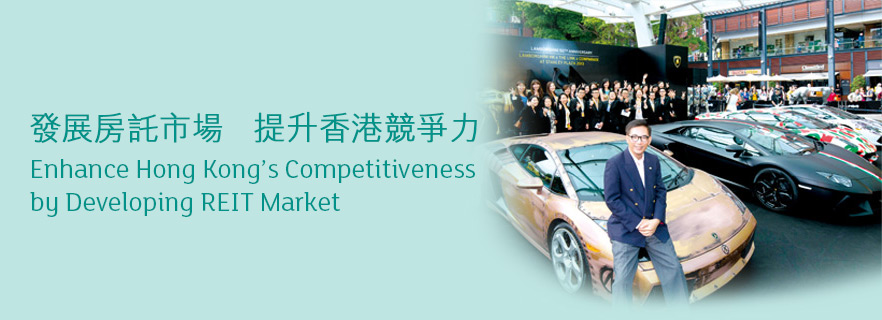
國際金融業發展一日千里,香港要保持作為國際金融中心的優越地位,必須因應市場環境積極求變,有見亞洲地區財富高速增長及內地的市場改革,本港亦積極配合,多方面強化優勢,以提升本身作為離岸人民幣業務中心和國際資產管理中心的角色。
2005年本港房地產投資信託基金的推出,亦是國際金融產品發展的重要里程碑。房託基金作為一種集體投資計劃,讓投資者可以共享集體投資帶來的優點,包括專業管理、規模經濟、分散投資等。房託基金的業務方針明確,按規定只能投資於房地產,跟直接投資於物業相比,套現能力及流通性較高,因此為投資者於購買物業及相關行業股票以外,提供另一投資工具,以把握房地產行業的發展機遇,令投資組合更加多元化。簡言之,投資者只需44.45港元(為2013年5月7日收市單位價格)就能買一個單位的領匯房託基金,間接成為本港部分大型零售資產的擁有者之一。
亞洲地區的房託發展歷史較短,日本於2001年推出首個房託後,香港亦隨即成立房託相關監管架構。2005年領匯於香港上市,標誌本港房託市場的誕生。作為全港首個政府資產全面私有化項目,領匯肩負著獨特的歷史任務──期望透過為顧客引進更多消費及飲食選擇,活化社區,釋放商場及停車場的最大潛力。
亞洲區內的房託要繼續良好的發展勢頭,有賴業者發揮創意,嚴守紀律,努力為顧客和投資者增值,而優良的監管架構則提供合適的土壤,有利業界持續擴展。以新加坡為例,當地房託享有較大靈活性,除了併購及翻新物業外,更可動用不多於10%資產購地興建物業作投資用途,故其房託市場發展比香港迅速得多。觀乎全球已發展市場,唯獨香港缺乏此項靈活性。
領匯物業當中,一些樓齡高達30年,即使進行翻新工程亦受到各種限制,拆卸重建給租戶、顧客和投資者的益處應會較翻新更大。新加坡的經驗或有值得借鏡之處,我們亦期望有關當局能考慮為條例加入更多彈性,促進香港房託發展,進一步提高其在國際金融市場的競爭力。房託基金是金融產品的重要用家,其擴展必然增加對證券經紀乃至商業和投資銀行服務的需求,這些都是香港金融市場的支柱行業。
只有七年半歷史的領匯已進行了廿六項翻新工程,優化購物設施,吸引人流,為消費者提供更貼心的購物體驗,為商戶創造更暢旺的營商環境,為本地社區提供更多工作機會。近年亦購入零售物業,發揮本身專長,服務更多商戶及顧客。至今我們已發展成為以市值計現時亞洲地區最大型房地產投資信託基金,亦是全球以零售物業為主最大的房地產投資信託基金之一。各方持份者的支持是我們工作的原動力,領匯團隊會繼續堅守業務宗旨,全力以赴,優化香港的零售基建,同時為香港房託業及金融界發展出力。
王國龍
2013年5月
The development of the international financial industry has been robust and rapid. To maintain its position as an international financial centre, Hong Kong must align itself with market changes and strengthen its advantages in view of the rapid growth of wealth in Asia as well as market reform on the Mainland. By doing these two things, Hong Kong can enhance its role as an offshore RMB business centre and international asset management centre.
The launch of real estate investment trusts (REITs) in Hong Kong in 2005 marked a milestone in the development of financial products. A REIT is a collective investment scheme with clear business objectives that allows investors to share the benefits of investing as a group, including professional management, economies of scale and diversification of investments. REITs are required to invest in real estate only. Compared to direct investment in property, marketability and liquidity are higher. Therefore, REITs provide investors with an investment alternative to purchasing properties and investing in property-related stocks, allowing them to diversify their portfolios and capitalise on the development of the real estate industry. Simply put, a retail investor with as little as HK$44.45 (closing unit price on 7 May 2013) can buy a unit of The Link REIT, and indirectly become a part owner of some of the largest retail assets in Hong Kong.
The development of Asian REITs has only taken place recently. The first Asian REIT was launched in Japan in 2001, and Hong Kong subsequently set up a regulatory framework for REITs. The listing of The Link in 2005 marked the birth of the local REIT market. As Hong Kong’s first-ever 100% privatisation of government assets, The Link has the unique mission of realising the growth potential of shopping malls and car parks by bringing more dining and shopping choices to customers to revitalise the communities where we operate.
The growing development of regional REITs depends on the creativity and discipline of the industry to add value for customers and investors. A good regulatory framework provides a suitable platform to the industry for continuous expansion. In Singapore, for example, REITs enjoy relatively more flexibility. Apart from acquiring and renovating properties, they can use not more than 10% of their asset to purchase land to build property for investment purpose. As such, the REIT market in Singapore has developed relatively much more rapidly than Hong Kong, which remains the only developed market in the world without such flexibility.
For properties under the management of The Link, some are up to 30 years old, and their renovation is subject to various restrictions. Therefore, demolition and redevelopment could offer greater benefits than renovation to tenants, shoppers and investors. Singapore's experience provides us with a noteworthy example, and we hope that the relevant authorities can consider adding more flexibility to the regulations for the development of REITs in Hong Kong to enhance their competitiveness in the international financial markets. REITs are also heavy users of financial products. The expansion of this sector will inevitably provide increased demand for financial services from stock brokers to commercial and investment banks, which are the pillars of Hong Kong financial market.
The Link was established only seven and a half years ago, but we have already completed 26 renovation projects, enhancing shopping facilities to attract visitors, providing consumers with a more comfortable shopping experience, creating a more robust business environment for tenants and providing a large number of job opportunities to local communities. Recently, The Link began to acquire retail properties to serve more tenants and customers by leveraging our expertise. We are currently Asia’s largest REIT and one of the world’s largest retail property focused REITs in terms of market capitalisation. We remain motivated to succeed by the support we receive from our stakeholders. We will continue to adhere to our business objectives to improve Hong Kong’s retail infrastructure as well as contribute to the development of the REIT and financial industries of Hong Kong.
Chief Executive Officer
May 2013
The Asia Pacific Real Estate Association (APREA) published a research report in 2012 conducted by the University of Western Sydney in relation to the performance of Asian REITs. According to the report, most Asian REITs, when compared to their respective stock markets, delivered higher returns, lower risk and superior risk-adjusted performance. This was particularly evident during the Global Financial Crisis, proving the defensive characteristics of REITs as an investment with a strong yield focus. Meanwhile, by calculating the correlation coefficients of REITs and other investment tools in the region, it was illustrated that REITs provide more diversification benefits than stocks and bonds.
